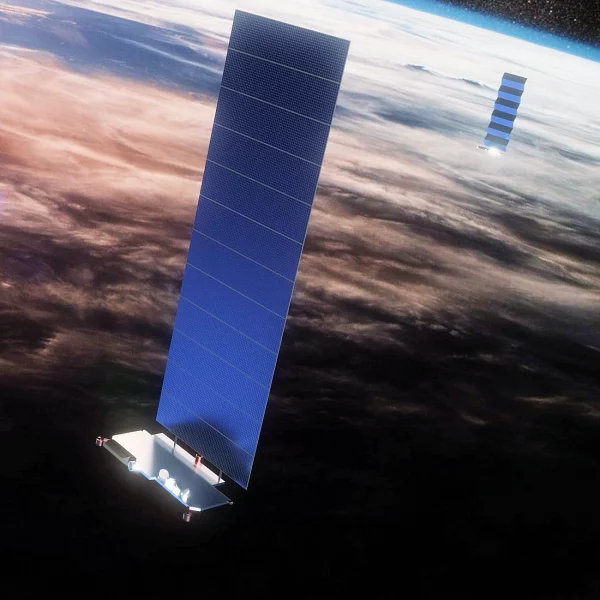Starlink Test Cheaper But Slower LEO Satellite Broadband Plan

Starlink’s (SpaceX) mega constellation of ultrafast broadband satellites in Low Earth Orbit (LEO) has become a popular solution for UK customers in remote rural areas, yet its adoption is often held back by the high price of entry. But the space ISP is now testing the waters with a 50% cheaper plan, albeit one with caveats.
The operator currently has around 5,500 LEO satellites in orbit around the Earth (altitudes of c.500-600km) and they’re in the process of adding thousands more by the end of 2027. Customers in the UK typically pay from £75 a month, plus £449 for the hardware (currently discounted to £225 or £150 if refurbished) and £20 for shipping on the ‘Standard’ package (currently free), which promises fast internet latency times of 25-50ms, downloads of c. 25-100Mbps and uploads of c. 5-10Mbps.
However, the above package is considered to be Starlink’s cheapest one, which is still too expensive for many consumers. But the company is also well known for testing different plans in different countries, which is often as much about experimentation as it is about the limitations of ground station capacity and other factors in each specific market.
Advertisement
The latest example of this comes from New Zealand, which until recently offered a similar Standard plan to the UK ($159 or £76.70/month). But Starlink has just introduced an additional Deprioritized Service Plan, which cuts the monthly price in half to the equivalent of just $79 per month (£38.11). This is much more in the realm of mass consumer affordability, although naturally there’s a catch.
What is the Starlink “Deprioritized” Service Plan?
(Currently only available in New Zealand)
Starlink “Deprioritized” Service is a more affordable service plan that is designed for Personal, Family, or Household-use at a fixed, land-based location at a valid location in New Zealand. Users will have an unlimited amount of Standard data each month with no long-term contracts or commitments (similar to Starlink’s “Standard” Service Plan).
This service plan will be deprioritized over Standard Service during peak hours. This means that speeds may be slower for Deprioritized Service relative to Standard Service when our network has the most users online.
With the Starlink “Deprioritized” Service Plan:
➤ There are no data caps and no speed caps
➤ Speeds should range from 50 – 100 Mbps (as compared to 150 – 250 Mbps for the Standard [NZ] service plan)
➤ You may upgrade to “Standard” Starlink service at any time
➤ Mobility (in-motion) or Maritime (ocean) use is not allowed
➤ Pause Service feature is not supported
➤ Ability to opt-in to purchase Priority or Mobile Priority Data is not supported
We’ve long been calling for Starlink to introduce a plan like this, although the realities of satellite-based economics often make such a service hard to do without too many compromises (e.g. usage restrictions or dramatically slower speeds). But the above service still manages to promise reasonable speeds and unlimited usage, which could make it significantly more attractive for those in remote rural areas.
The catch is that, for now, you’ll only be able to get this in New Zealand and there’s currently no indication of whether or when it might launch anywhere else, including in the UK. Equally it’s possible that a UK version of the package might differ, such as in terms of the promised service speeds or restrictions, which as stated earlier is defined by a combination of the local market, ground station capacity and other factors.
Mark is a professional technology writer, IT consultant and computer engineer from Dorset (England), he also founded ISPreview in 1999 and enjoys analysing the latest telecoms and broadband developments. Find me on X (Twitter), Mastodon, Facebook, BlueSky, Threads.net and Linkedin.
« Ex-BT Boss Gavin Patterson Joins Board of UK AltNet Aggregator X3T






















































“There are no data caps and no speed caps”
isn’t this literally the idea of the service?
It does seem like saying “no speed caps” is a contradiction :).
They probably mean no hard cap so if the capacity is available, not being used by the people paying for higher priority, these customers can access it.
This could be done on any shared resources network so cable, PON, WiFi, and already is on some mobile networks.
$79 is £62 btw.
NZD: $79 = £38
USD: $79 = £62
It quite clearly states NZD in the article. You are aware other countries besides the US use dollars? Yes?
79 New Zealand Dollars, not US dollars.
Did you know starlink is €40 in Europe?
It seems like UK is getting massively ripped off. But Ive read about a few people buying and activating it and then “moving” (not really) to France and adding roaming. Still in UK but paying the much lower french prices. Is Elon anti-british? He does seem like it.
As the article hints, the packages, prices and caveats vary between countries. So you’ll find quite a mix across Europe and not one simple pricing structure. Some also have harder usage caps, while others don’t.
France is not Europe
Iceland and Norway pay $99. In Canada it’s $140
Just because different countries have higher taxes and regulations, does not mean it’s Elon hating you, it’s the state hating you
VAT is 20% in France
VAT is 20% in UK
In UK the price is £75. In France, the price is £34.
The price is set by Starlink. It’s got nothing to do with taxes. You sound exactly like Elon “the reason Tesla is higher in the UK is taxes”, when you can import one, pay the tax and still save about £5,000
VAT is not the only tax in existence
Ok John, please tell me exactly what tax makes Starlink charge UK more money than France.
Don’t argue with the musk fan boys.
They don’t do things like facts they just repeat whatever their idol says. Of course there is no special UK starling tax. He won’t be able to prove his point but he’ll keep trolling you if you let him. It’s always best to ignore Elon fans.
Are there any restrictions on that price such as a data cap?
https://www.ispreview.co.uk/index.php/2022/08/caveats-as-spacex-trial-cheaper-starlink-satellite-broadband-plan.html
No. The French 40 euro one is full-speed, uncapped. There is a lower one with caps and lower priority.
A company is free to set the prices to their products. They don’t have to be equivalent to other countries. Maybe France has better fibre than the UK so Starlink has to compete on price with FTTP which is really hard for Starlink so they had to lower their prices.
I thought France had less corporate tax but was wrong. Like Greenlantern said, the French market is much harder to penetrate, hence why they had to cut prices
Still, places like Canada and Spain are more expensive because taxes there are much worse
Greenlantern – Starlink isn’t competing with FTTP in any country. It isn’t serious competition to even a good FTTC connection. I’m sure there are people who have dumped a perfectly fine wired connection for a much more expensive (and much more variable) Starlink connection, but it isn’t the norm.
As this esteemed organ has reported – starlink’s UK customer numbers are hilariously bad. I’m not surprised given that almost everyone can get cheaper or faster services.
This *is* the sort of country where SpaceX need to bring out a lower plan in the hope of gaining customers!
I never disputed that there can be different operating costs involved. It’s entirely possible energy is cheaper in France too. The problem I have is when Elon fans say it’s taxes and it’s your government. OK, show me the tax. Saying “it’s taxes” and then not substantiating it, and then changing the argument to well operating costs are different isn’t the argument that was being debated. Fact is it’s cheaper elsewhere, it’s hard to find out why, and the answer isn’t taxes (which is what Elon claimed about Tesla cars when in actual fact it’s just Tesla upping their costs for the UK).
Canada has higher corporate tax, higher income tax than the UK, and I’m sure many other expenses, that is a fact, nothing to do with fan to point out a fact
Operating costs and market penetration are much more plausible than “Elon hates UK”
Tax to GDP ratio is considerably higher in the UK than in Canada and way lower in the UK than in France just FYI. Suspect you’ve just Googled the marginal income tax rates ignoring that Canada has a bunch of deductions, credits, etc, available. Regardless the tax to GDP ratio is where it’s at.
I imagine the actual answer is nothing more interesting than that France’s fixed line prices are mostly lower than the UK’s, in no small part thanks to government regulation, while Canada’s pricing for fixed line is higher than the UK’s.
Starlink are a business: they’ll charge whatever they think the market in question will tolerate.
However when all you have is a hammer everything looks like a nail. When you hug the nuts of libertarians government seems the root of all problems and the answer to none.
@Ivor. Sorry, you are plain wrong with your comment. I have dropped a 60Mbit VDSL service to go with Starlink full time and the difference is night and day. Yes, the latency is higher, but by only 10ms. The speed is leagues ahead! Whilst yes the speed varies, it is never under 100Mbps, and typically when doing a lot of downloading I can easily reach 300Mbps.
I’d like to think the price is higher in the UK because the cost of running the base stations is higher…
IMO a super low usage (e.g. rate limited to 1Mb) plan would be useful as a backup connection, with the option to upgrade to a “full” plan at any time.
With the prospect of Starlink @ 40 Euros per month, I’m sure our boy Rishi, will be looking for an issue to revive the election prospects of the party.
He will, of course, immediately see the opportunity to resolve the issue of providing a modern internet connection to the last 20% of “Difficult-to-connect-fibre customers”, especially in rural areas.
This being achievved by banging a few UK Telecom providers heads together and getting them to approach Starlink to see if they are prepared to provide community scaled dishes which can then be connected to a LOCAL fibre network . . . . per the American Sat/co-ax cable model that has been around since the late 1970s.
What’s not to like.
This could be an interm solution . . . which then permitted the extension of fibre to one and all, to follow, in a much more relaxed time-scale. This would make the economics of fibre-to-all more bearable for the telco providers and avoid the need for them to continually go through the farce of issuing target implementation dates which no-one who was involved believed in.
One reason why Prices are higher in UK compare to say France is due to the number of possible connections over small area. So one way to control demand is with price. (ie France have similar population size to UK but landmass is much higher.